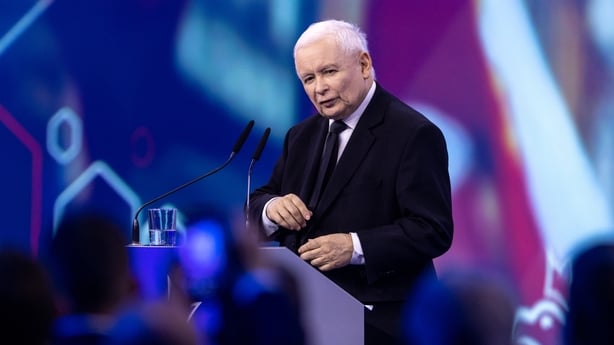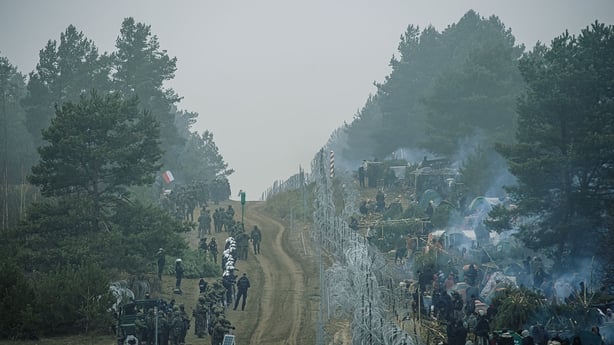Poland's Prime Minister Mateusz Morawiecki told reporters ahead of a European Council summit in Brussels yesterday that he would restate his country’s opposition to a European Union deal on the relocation of migrants, agreed upon earlier this month by most member states.
Mr Morawiecki said he would also demand more support for Frontex, the EU's border agency, headquartered in Warsaw, to deal with people smugglers, as well as more funding for member states to secure the bloc's external borders.
Both Poland and Hungary have voiced their opposition to the migration relocation pact.
The deal stipulates that EU member states would be responsible for accepting a set number of migrants each year.
Countries that refuse to accept their quota of irregular migrants and refugees would then be required to pay €22,000 per person to assist other member states that have signed up to the deal.
"Like most, if any position that the Polish government is currently putting on the table, it’s driven by domestic politics and the elections," Wojciech Przybylski, a political analyst, told RTÉ News.
Mr Przybylski said that Poland’s ruling right-wing Law and Justice party was trying to replicate a position that the party had taken in opposition prior to 2015, and that the timing of the move was "self-explanatory".
Poland will hold a parliamentary election in October, and critics of Law and Justice say that the party is using its opposition to the migrant deal to increase its supporter base ahead of the vote.
In Brussels, Mr Morawiecki emphasised his government's opposition to any potential financial penalties against Warsaw for refusing to accept migrants.
"No to forced relocation of migrants, no to the violation of veto rights by individual states and no to the violation of the principle of sovereignty of decisions, no to imposed penalties from Brussels," he told reporters.

Jaroslaw Kaczynski, the leader of Law and Justice and Poland’s deputy prime minister, has said that Poland has already accepted between 1.5 and 2 million Ukrainian refugees since the start of Russia’s invasion in February 2022, and had only received "symbolic funds" from the EU for doing so.
Mr Kaczynski said that the Polish government had, to-date, spent €6.75 billion (30 billion zloty) on hosting Ukrainian war refugees.
He said that the EU migrant pact made a "mockery of Poland", and has proposed that a referendum be held to decide whether Poland accepts the new scheme.
That vote could be held on the same day as the parliamentary election in October, according to deputy foreign minister Pawel Jablonski, who made the remarks during an interview with radio broadcaster WNET in mid-June.
A poll by IBRiS, published yesterday by daily newspaper, Rzeczpospolita, found that 50% of respondents were in favour of holding a referendum on the EU migrant deal, versus 47% against.
Supporters of Law and Justice and its minor coalition partner, Sovereign Poland, were most in favour of holding a referendum.
Law and Justice has governed Poland since 2015, and had opposed, along with Hungary, a similar EU immigrant relocation scheme in response to the arrival of more than one million refugees on the continent that year.

In late 2021, the Polish-Belarusian border was the scene of a standoff between Polish authorities and migrants attempting to cross into Poland from Belarus.
At the time, the EU accused Belarus of pushing migrants, many of whom were from the Middle East, towards the border.
Poland's government viewed the stand-off as a form of "hybrid attack" by Minsk, and Mr Morawiecki again emphasised that point in Brussels yesterday.
He said that Belarus was part of Russia's plan to attack Europe, and that Moscow was "using various methods to do this, including hybrid, organised groups of illegal immigrants".
Both Mr Morawiecki and Mr Kaczynski, have held press conferences in recent weeks on the issue of immigration, against the backdrop of a five-metre high steel barrier that Poland has constructed along its border with Belarus.
Poland's opposition to the EU plan is the latest in a number of disputes between Warsaw and Brussels, most of which involve the handling of EU rule-of-law, such as the independence of the Polish judiciary.
"I think the Polish position in the EU says, 'we don’t care what the European Commission, or the EU thinks of us overall," said Mr Przybylski, editor-in-chef of Visegrad Insight.
"The government wants to manifest that they don't want to have their business interrupted by external forces."
Additional reporting Reuters







